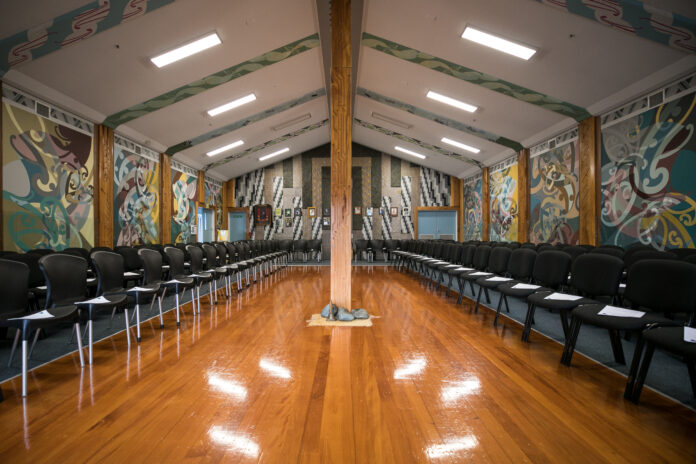Source: NorthTec
As Covid continues to disrupt everyday life, Te Tai Tokerau Wānanga NorthTec has embraced digital technology and filmed an online Pōwhiri to take the place of the in-person event, which is unable to go ahead at the current Red Alert Level.
NorthTec’s Te Amorangi (Senior Māori Executive) Taipari Munro and the Te Hāpai Ara (Cultural Capability Team) were at the forefront of the planning, working with NorthTec’s marketing team to create the video while ensuring tikanga was the main guiding principle throughout the process.
It was decided that an online, recorded Pōwhiri would be shown to students on the first day of semester, with tutors being briefed on how to appropriately facilitate engagement with the process.
“The most important part of the process was maintaining a Māori view and Māori voice throughout the filming and editing,” says Matua Tapari Munro. “This is especially evident in the editing process. There are important aspects of culture and tikanga that needed to be observed. We were very fortunate to have multiple people on staff to help with the filming and editing, enabling clear sound recording and multiple angles with which to work from.”
The idea of a virtual Pōwhiri did cause a healthy amount of kōrero around tikanga and the upholding of traditional practices. Many worried the rapid adaption of culture that has taken place over the last two years could be detrimental to te ao māori.
“My father told me mahia te mahi, do what has to be done,” says Ripeka Walters, NorthTec tutor for Te Reo. “We knew what had to be done and we did it. It is what it is, you have to be open minded.”
“We need to accept it without judgement, anger, and fear,” says Matua Ross Smith, a member of NorthTec’s Te Hāpai Ara team. “We need to be solution-focused, not reacting negatively. The old people made it clear and simple, he ao hurihuri, an ever-changing and evolving world. While we might blame covid for our situation, I personally have seen the decline in our traditions pre-covid, and it’s nobody’s fault but our own.”
The process was not without its complications, time constraints meant the filming and editing took place over four days, forcing a very quick turnaround. Many key people, such as those performing the karanga or karakia had to become comfortable performing in a cultural space while in front of a camera, something many have never done before. However, the support for the project was very notable.
“It was very important that students and staff being welcomed were able to see people from all areas of management,” Matua Taipari explains. “We had a good turn out from our Senior Leadership team, our pathway managers and our tutors.”
“One of the most important parts of any Māori cultural ceremony is the sharing of kai.” Matua Tapari explains. “We were very grateful that our Student Services team was able to provide funds for food so that students and staff being welcomed to NorthTec were able to have a morning tea after the Pōwhiri video was shown. Their support was most appreciated.”
As with many things, there can always be a silver lining to any dark cloud, so it is with the virtual Pōwhiri. There is hope that as the Pōwhiri is shown to all students, not just those who would normally attend the in-person event, it will promote further cultural engagement. Those that may have been hesitant before will better understand the significance of Pōwhiri.
“We’ve had a lot of good feedback from ākonga,” says Ripeka. “When you’re in a Pōwhiri you don’t get the chance to explain things as you go. However, with the recorded version we can explain the process, and discuss why each section is important. It means ākonga, even those of Māori descent, can get more engagement and develop understanding.”



